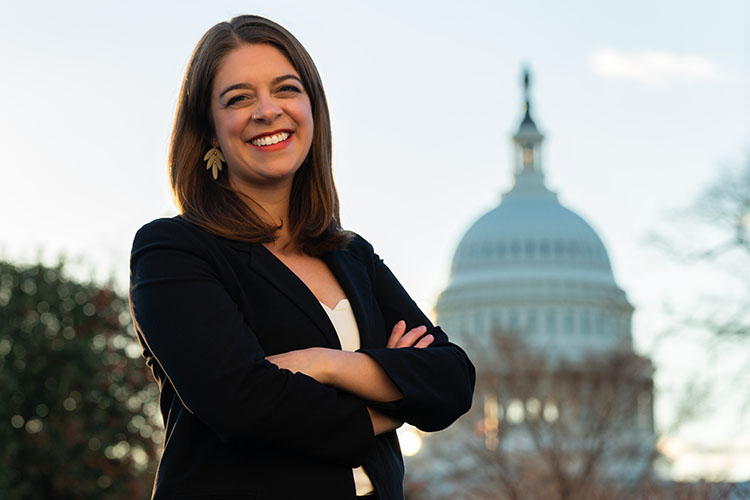What inspired you to pursue an MPH in Public Health Policy? Why did you choose UWM?
I began my career in tobacco prevention and control. This was at a pivotal time when we were seeing the results of policies that were making lasting changes for the public’s health. Even as a young advocate, I saw how my voice could help create a better future.
I chose to pursue my MPH at UWM because I saw their staff and faculty at work in the community. I wanted my education to echo the community organizing and grassroots skills I was learning in my working world.
What were some of your favorite experiences as a student at UWM?
I was a student in the first MPH Public Health Policy cohort, and I witnessed so many firsts in the college’s history, including its first doctoral dissertation, the first graduates of the new MPH tracks, and brand new class curriculums. My most treasured memories come from all the other students I met during my time at UWM. People come to public health from so many other sectors and areas of study – and it just makes our field that much stronger.
What have you been doing since graduation?
The seven years since graduation have been incredibly formative – not only me – but also for the field of public health. After graduating, I worked at the University of Wisconsin – Cooperative Extension, where I supported local Extension agents doing policy, systems, and environmental changes for chronic disease prevention in their communities.
I then moved to Colorado and worked at the Tri-County Health Department, covering the eastern band of the Denver metro area. There I led local tobacco prevention and food/beverage policy campaigns with the 26 jurisdictions served by that health department.
When the Covid-19 pandemic began, I was activated on the response and found myself excited about all the policy opportunities in the public health preparedness space. That led my next step of moving to Washington, DC and serving on a contract as a Senior Public Health Policy Specialist at the Department of Homeland Security’s (DHS) Office of Health security out of a firm called LMI.
What are some of your proudest accomplishments as a public health professional?
I am proud of my role on the COVID-19 response as a founding member of the Business Recovery Task Force. The team comprised of four of the health department staff who, like myself, had existing relationships with local governments and businesses. We served as liaisons for jurisdictions, supporting education and implementation plans for the COVID-19 prevention restrictions for different types of industries. We hosted countless town halls across many sectors. We managed a hotline and email inbox where we fielded questions from the community directly. At times our recommendations flowed up to the state level to create guidance and policy edits that could best serve our communities.
Another recent pride point is my role in standing up a new federal office as part of the work on the contract I serve. The Office of Health Security is the principal medical, public health, and workforce safety authority within the Department of Homeland Security. Much of the support I offer to the office is grounded in my experience at the state and local levels of public health. My community-based perspective allows me to advocate for how the initiatives of this office can best serve our partners at all levels of government. Being given the chance to roll up my sleeves and build a new office, processes, and team dynamic is an opportunity I will never forget.
Did you do any internships or fieldwork as part of your program at UWM? If yes, how did that prepare you for your career in public health?
I did my capstone fieldwork with the Wisconsin Alliance for Women’s Health (WAWH) and I will forever be grateful for the lessons I learned through the strong, collaborative leadership of Executive Director Sara Finger and the whole team.
Through this experience, I learned a lesson in how to pivot – an important policy skill in itself! The design of my project, which was uncovering what materials existed to support the public health workforce to be trained in policy advocacy, shifted halfway through. Sara worked hand-in-hand with me to develop the product, even in the midst of the focus change, that would be most useful for WAWH’s purposes and was doable for my process. Her generosity, flexibility, and thoughtful interactive support will stay with me as I manage others.
What difference to you most hope to make in the world through your work in public health?
The adage of “health in all policies” will not be a reality until the public health field has an equity-grounded, adequately-funded, interdisciplinary infrastructure. Policy cannot be carried out in a vacuum. I hope to spend my career advocating for and building the connections and bridges between things.
What advice do you have for someone considering pursing a degree and career in Public Health Policy?
Public health policy is hard work and heart work. Your success in this field is not always the policy, it’s the conversations you have and the norms you start to shift. You will fight for the tangible policy to be put on the books, but as a smart advocate in Denver once said, passing a policy is step one out of ten. Real change comes from the people you inspire, connect to and serve with your work.
